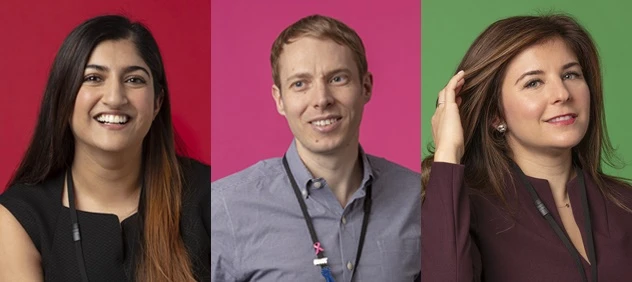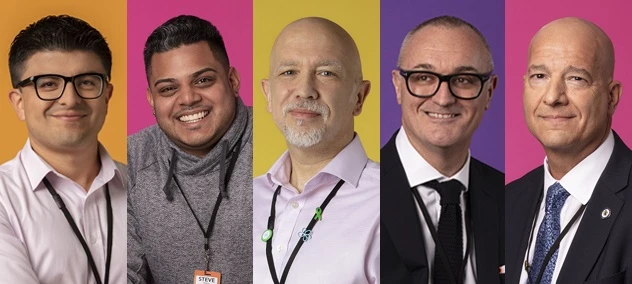How to work towards gender equality and inclusion, according to women and allies at Bloomberg
March 24, 2020
Inclusion is essential in ensuring employees feel supported to be their true selves at work and empowered to reach their full potential. It is what enables diversity to thrive and by emphasizing inclusion, companies create cultures in which employees feel valued and have the space to grow and succeed. But what does inclusion look like? While diversity focuses on the makeup of the organization, inclusion enables diversity efforts to change a company’s culture.
In celebration of International Women’s Day, we asked Bloomberg employees from offices around the world how they recognize inclusion at work, the power of strong allyship, and ways we can work together to reduce bias in the workplace.
What does inclusion mean to you at work?


True inclusion is supporting and making sure everyone is heard and valued. This improves engagement and contributes to better performance across the board. – Dhrutika Savla, Mumbai
Inclusion is in celebration of our differences. Feeling included means bringing all of ‘me’ to work each day. — Tatiana Chin, New York
To me, inclusion means eliminating discrimination and promoting equality. It means creating an unbiased environment that allows people to express themselves and be heard. – Songwei Yan, Tokyo
Inclusion means more than just being heard. It means being taken seriously and feeling empowered. From my first day here, I felt empowered to lead, to make decisions, to do my best work without my capabilities being questioned. – Meg Ely, New York
At work, inclusion allows employees to truly feel part of the business. We can’t enjoy the true value of a diverse workforce, without inclusion. True inclusion means employees can bring their best selves to work. – Katerina Domenikou, London
What’s the one thing we can all do to reduce gender bias?


Be curious. Dig into your default responses to people. We all have biases, it’s how we make sense of the world, and as children they served a purpose – what we can do as adults is become aware of them, question them and ask ourselves – what impact does this perception have on others?– Devina Rana, London
We should all make an effort to lose the cynicism towards creating a more inclusive working environment. It does take concentrated effort, and we should all understand the need to be proactive in addressing decades of gender bias in society. – Mark Smith, Tokyo
Provide candid, actionable, constructive feedback to everyone, not just people who look like you. People are held back when they don’t receive feedback linked to business outcomes. Don’t be the person who holds someone else back. Be the one who paves their path. – Elena Takacs, New York
What makes you excited and hopeful for the next generation of girls and women?


The fact that my daughter doesn’t question her ability and aspires for the same goals as boys and men gives me hope that things are moving in the right direction. It is not about women, nor is it about men. We are all equal and it’s as simple as that. – Tomoko Yamazaki, Singapore
I’m excited for the next generation of girls/women to feel inspired and encouraged by the wave of powerful female leaders around them. I’m eager for them to know that they can do it too. – Jacqueline Pan, New York
I am looking forward to seeing more female leaders from the next generation. Girls today are exposed to female role models and they’re seeing them balance both their personal and professional lives successfully. This helps create a path for them to follow. – Maulshri Sura, Mumbai
I am excited for the next generation of women’s accomplishments to be all about merit. It will not be about being the “first woman” or the “only woman” who succeeded at what she put her mind to but about the “individual” who broke through barriers. We will not lead with the person’s gender, but with their excellence. – Andrea Desosa, New York
How important is allyship in ensuring women are included and advancing in their careers?


Allyship is not just important, it is essential in any effort to end systematic gender disparities in the workplace. Inclusion is a critical organizational challenge that will positively impact employee engagement as well as add to the bottom line when successfully addressed. – Marco Mejia, Singapore
We should be engaged from as early a stage as possible to identify the career interests and goals for women in our workforce, and practice active listening to help us in gathering the insight we may need to support them in reaching their goals – Steve Pinell, New York
Allyship is vitally important for women, as an ally is someone who should be relied on to get things done. Allies have networks, and their primary purpose (for me personally) is being a vocal advocate. Being present and putting in the work shows you are committed to the cause. – Carl Rautenbach, London
As an ally, words without actions can be detrimental in the effort to change a culture or mindset. My advice is to speak up in situations where bias is present and really practice being an active ally and advocate for women. – Andrew Bimson, New York
As allies, I believe we can and must reinforce opportunities for growth by recognizing the contributions and potential of our female employees and being visible advocates for them. We have absolutely incredible people working in every segment and cultivating talent is essential. – Eduardo Jany, New York